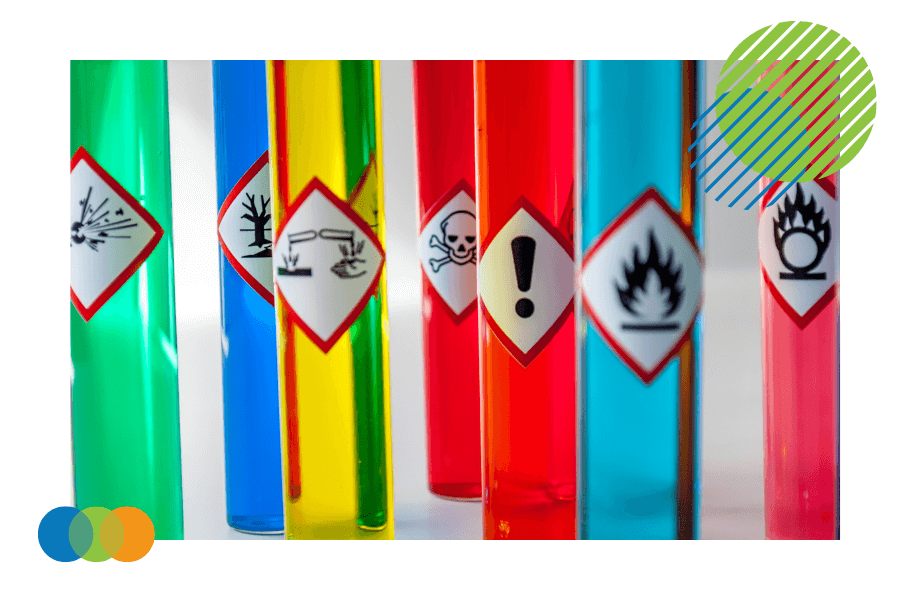 |
Written by Liz McDermott |

Are you aware of the hazardous products you work with every day? Do you know how to handle them safely? If not, then you need WHMIS training.
The Workplace Hazardous Materials Information System (WHMIS) is a comprehensive system that provides information on chemical hazards in the workplace in Canada. Adequate WHMIS education and training is essential for occupational health and safety for anyone who works with hazardous chemicals, including employers, supervisors, and staff using any hazardous product.
But as a worker or employer, you may have questions about the validity of WHMIS training. Does WHMIS training expire? How often do you need to renew it?
In this article, we'll explore the details of WHMIS education and training, including its validity period, the latest version, how often you need to renew it, and why it's essential to stay up-to-date.
What is the validity period for WHMIS?
WHMIS training has a validity period of three years. This means that after three years, you must refresh your education to ensure you are up-to-date with the latest information and WHMIS regulations. It's important to note that the three-year period starts from your last education session, not from the date you received your certificate. A clearly defined expiration date should be made available to all staff.
The validity period is crucial to safety legislation because it ensures employees can access the most current information on hazardous substances. As the technology and research on chemical substances evolve, updating your knowledge regularly is vital.

What is the latest version of the WHMIS program?
In 2015, WHMIS underwent a significant update to align with the Globally Harmonized System of Classification and Labelling of Chemicals (GHS). This update is known as WHMIS 2015. This latest version has updated all hazard information, classifications, labels, and safety data sheets (SDSs). The new system is designed to be more consistent with international standards, making it easier for employers and employees to understand hazardous substances.
It's essential to note that WHMIS 1988 and WHMIS 2015 are not interchangeable. If you took WHMIS 1988 training, you would need to take the latest version of WHMIS education to be up-to-date.
What are the employer's duties?
Businesses have several duties regarding WHMIS and training programs. These duties include:
- Providing workers with access to WHMIS education
- Ensuring that workers receive training on the chemicals they work with
- Ensuring that workers are up-to-date with the latest WHMIS information
- Providing workers with access to SDSs
- Ensuring that chemicals are properly labeled and stored
- Establishing emergency procedures and first aid measures
As an employer, how often do I need to provide WHMIS training?
Companies must ensure that employees exposed to hazardous chemicals receive training every three years. After three years, workers must renew their training to ensure they have the most up-to-date knowledge. It's essential to note that this three-year period starts from the date of your last training session, the defined expiration date, not the date you received your certificate.
However, there are situations where you may need to renew your WHMIS training before the three-year validity period. Employees must receive additional training if work conditions change, new chemicals are introduced, or your health and safety committee identifies different hazards or ways chemicals are handled.
Since chemical hazards are constantly changing, many workers receive WHMIS training annually as a health and safety best practice recommended by Health Canada.
Who should receive WHMIS training?
Everyone who works with chemicals should receive WHMIS training. This includes employers, supervisors, and workers. Employers are responsible for developing a training program, providing their staff with WHMIS training, and ensuring that their workers are up-to-date with the latest information.
What topics should WHMIS training cover?
WHMIS education and training should cover topics such as:
- The hazard classes and categories used in a supplier label
- The symbols and pictograms used to communicate hazards
- The safety data sheet (SDS) and their contents
- The responsibilities of employers, supervisors, and workers
- The safe handling, storage, and disposal of chemicals
- Emergency procedures and first aid
If I change employers, do I have to retake WHMIS training?
If you change companies and have a valid WHMIS certificate, you may not need to retake WHMIS training if your employer verifies your WHMIS certificate is still valid. It's essential to check with your new employer to see if they require additional training for workers with an active WHIMS certificate.
Conclusion: Tips to stay up-to-date with WHMIS
WHMIS training is essential for anyone who works with hazardous products. It's important to remember that WHMIS training has a validity period of three years, and workers must renew their training to ensure workers stay up-to-date with the latest information. Employers also have several duties regarding employee education, including providing access to instruction, SDSs, and emergency procedures.
To stay up-to-date with WHMIS training, consider the following tips:
- Set reminders for when your training is due for renewal
- Keep up-to-date with the latest chemicals and their classifications
- Attend additional education when there are changes to the hazardous substances or the way they are handled
- Speak with your employer if you need further information about WHMIS training
Remember, WHMIS training is critical for your safety and the health and safety of those who work safely around you. Vubiz online WHIMS course helps workplaces stay up-to-date with WHMIS to ensure workers take the necessary steps to handle hazardous chemicals safely.
For more information, please contact us to inquire about our safety training programs.

